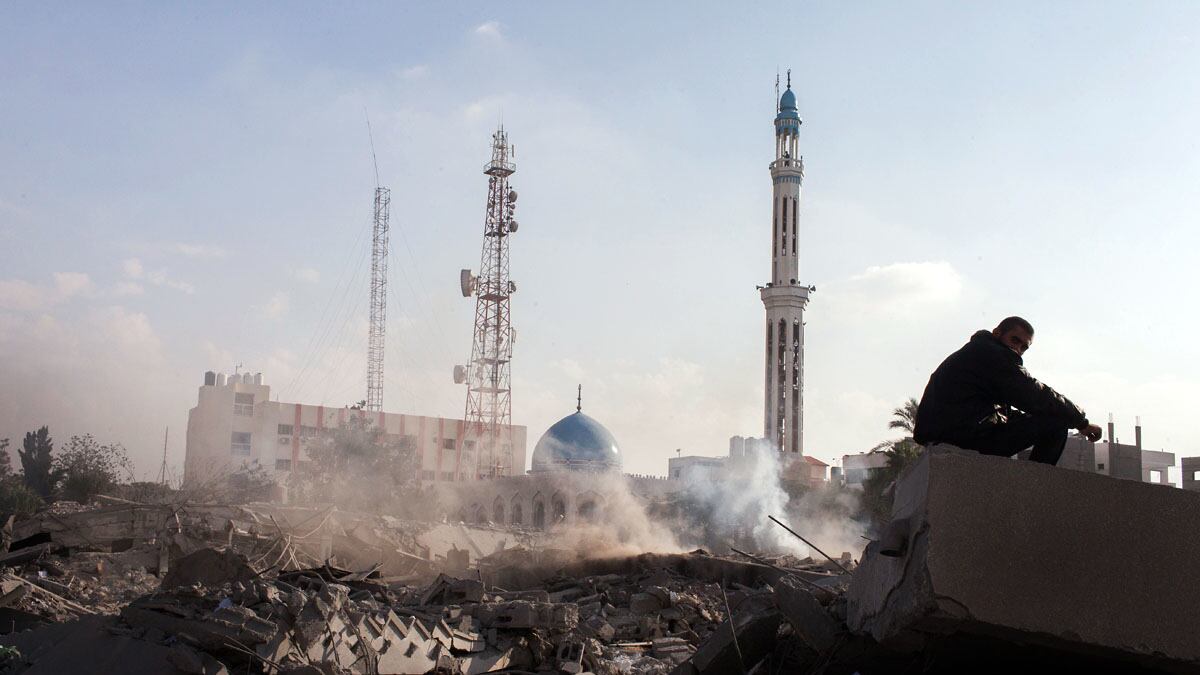In the tragic saga that is the Israeli-Palestinian conflict, the lopsided casualty rate in this past week’s campaign yet again presents an enormous moral dilemma for the Jewish state. Going just by the numbers—with more than 150 Palestinians killed, compared with a mere six Israelis—it doesn’t appear to be a fair fight.

Of course, for Hamas, it’s not for lack of trying that the body count was so miserably in Israel’s favor. Before Wednesday’s shaky ceasefire, Hamas launched more than a thousand rockets, hundreds of which were intercepted by Israel’s Iron Dome missile-defense system. Most of the remaining rockets landed in open fields away from civilian populations. A bus bombing in Tel Aviv resulted in two-dozen injured, but no deaths. Would Israel’s moral position be less troubling if Hamas had better aim or possessed more penetrating rockets?
Any other nation faced with the same existential threat would avail themselves of all resources to eliminate the danger—and international law would not be violated. And yet, the protesters who object to Israel’s imbalanced reprisals, and possess great clarity about what Israel cannot do in retaliation, are predictably tongue-tied when asked what it can and should do. And so Israel fights back, mindful of world public opinion and its own moral high ground, which can plummet when women and children become casualties of otherwise defensible actions.
ADVERTISEMENT
For nearly everyone watching from the sidelines, it’s difficult to recall how we got here. Since Israel’s founding in 1948, not a day has gone by when the Jewish state has lived in peace in the Middle East. Its neighbors never welcomed her, or even acknowledged her right to exist. Every regional war, every confrontation, resulted in a kind of delusional Groundhog Day where old ledgers got wiped clean and brand new grievances were avowed to be avenged.
This latest encounter would not have escalated had Hamas honored an earlier ceasefire and not launched hundreds of missiles during the last several months. Israel hoped to end the rain of rockets by assassinating Hamas’s military leader, Ahmed Jabari. Not surprisingly, this only culminated in more missiles—purportedly in retaliation for Jabari’s death. The rockets that landed in Israel over the prior few months were apparently forgotten as a new line got drawn in the sand.
With such recycled recriminations—tit for tat on steroids—it’s nearly futile to keep track of who started what and when. Every new attack invites a fresh reprisal of often disproportionate intensity. Scores are never settled, and getting even becomes both a psychological and mathematical impossibility.
Wars among nations are much more difficult to measure than are conflicts among individuals. With the latter, the lex talionis—the law of retaliation—governs the basic rules of “eye for an eye” justice. In a court of law, or even in the more earthy arenas of frontier justice where individuals take justice into their own hands, punishment generally fits the crime; it must be commensurate with the act. This is largely the reason why most legal systems do not punish a rapist by taking his life. His victim, after all, is still alive. Reciprocity when it comes to loss is not a justification for bloodthirstiness but rather a demand for exactness. You take a life, you must forfeit your own—no more, no less, measure for measure. Justice always requires a fair and proportionate punishment, and disproportionate retaliation necessarily fails the test of justified vengeance.
But this strict equivalence doesn’t work as well with grievances among nations. And especially in the Middle East, the doubling down on tit for tat is an all-too-uncommon occurrence. An eye for an eye can result in reprisals that far exceed the mere loss of eyesight. Thousands of lives can be extinguished from rockets aimed to avenge the loss of only a few. Smart bombs aren’t that smart; they don’t know exactly how many to kill. Retaliation in the global arena, inevitably, allows for less precision. Sometimes it can resemble lustful revenge.
The Allied bombings of Dresden and the atomic detonations over Hiroshima and Nagasaki were justified militarily, but the disproportionate civilian deaths were, for some, too morally painful to accept. Similarly America’s recent war in Afghanistan was intended to avenge 9/11, punish the Taliban, and disable al Qaeda’s terrorist operations, but thousands of civilians lost their lives, too.
It’s one thing to expect that reprisals among warring nations will fall short of strict proportionality—the relative body counts will be off, given the wide range and disparity of lethal weapons and the general chaos of war, which is not conducive to an identical tit for each tat. It’s quite another, however, to permit one nation to obliterate another or to conduct a war in complete disregard of human life. That’s precisely what the international community should be charged with preventing.
Under Article 51 of the United Nations Charter, Israel has the right to defend its citizens against Gaza’s rockets. And in doing so, it isn’t bound by some one-to-one formula. It has the right to regard the threat that Hamas poses as an annihilating one, given the emphatic language of its covenant. Yet because it is a liberal democracy guided by enlightened, humanistic values, which come into conflict whenever it is forced to defend itself against those for whom martyred lives are badges of religious honor, laws offer only limited guidance.
Israel’s moral dilemma is also untenably compounded by the asymmetry of its and Hamas’s campaigns on the ground. Hamas’s fighters, and their stockpile of weapons, are embedded among civilians—and targeting civilians and casually living among them violates the rules of war. Wholly unique to most armies, Israeli soldiers almost never confront a combatant in uniform. The hell that is war is magnified by the morbid knowledge that every weapon fired might kill an actual civilian, an innocent child, a pregnant woman. Generals of long ago rarely faced such foes or fought with such regret.
Former Israeli prime minister Ariel Sharon’s son, Gilad, recently called for the complete flattening of Gaza in order to decisively end the missile threat. He acknowledged that the images might be “unpleasant,” but it was necessary to keep Israel’s citizens safe.
The images of such a spectacle would be far more than unpleasant—and so the Jewish state, burdened like the ancient tribes from which it descends, will continue to navigate the moral morass, challenging our understanding of justice along the way.






